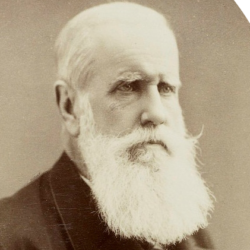 Dom Pedro II (also with the surname: d'Alcantara; 2 December 1825 – 5 December 1891), nicknamed "the Magnanimous" (Portuguese: O Magnânimo), was the second and last monarch of the Empire of Brazil, reigning for over 58 years. He was born in Rio de Janeiro, the seventh child of Emperor Dom Pedro I of Brazil and Empress Dona Maria Leopoldina and thus a member of the Brazilian branch of the House of Braganza. His father's abrupt abdication and departure to Europe in 1831 left the five-year-old as emperor and led to a grim and lonely childhood and adolescence, obliged to spend his time studying in preparation for rule. His experiences with court intrigues and political disputes during this period greatly affected his later character; he grew into a man with a strong sense of duty and devotion toward his country and his people, yet increasingly resentful of his role as monarch. Pedro II inherited an empire on the verge of disintegration, but he turned Brazil into an emerging power in the international arena. The nation grew to be distinguished from its Hispanic neighbors on account of its political stability, zealously guarded freedom of speech, respect for civil rights, vibrant economic growth, and form of government—a functional representative parliamentary monarchy. Brazil was also victorious in the Platine War, the Uruguayan War, and the Paraguayan War, as well as prevailing in several other international disputes and domestic tensions. Pedro II steadfastly pushed through the abolition of slavery despite opposition from powerful political and economic interests. A savant in his own right, the Emperor established a reputation as a vigorous sponsor of learning, culture, and the sciences, and he won the respect and admiration of people such as Charles Darwin, Victor Hugo, and Friedrich Nietzsche, and was a friend to Richard Wagner, Louis Pasteur, and Henry Wadsworth Longfellow, among others. There was no desire for a change in the form of government among most Brazilians, but the Emperor was overthrown in a sudden coup d'état that had almost no support outside a clique of military leaders who desired a form of republic headed by a dictator. Pedro II had become weary of emperorship and despaired over the monarchy's future prospects, despite its overwhelming popular support. He did not allow his ouster to be opposed and did not support any attempt to restore the monarchy. He spent the last two years of his life in exile in Europe, living alone on very little money. Filter resources by Category Filter resources by Tag Filter resources by Collaborator Name Filter resources by Language Filter resources by Date Range
Contributed by:
Dom Pedro Ⅱ, Aharon N. Varady (transcription) This is “Had Gadiâ | Un Cabri: La Légende de l’Agneau (Poésie chaldaico-provençale, chantée a la table de famille les soirs de Paques),” a translation of Ḥad Gadya into French by Dom Pedro Ⅱ (1825-1891), emperor of Brazil, as published in Poésies hébraïco-provençales du rituel israélite comtadin traduites et transcriptes par S. M. D. Pedro Ⅱ, de Alcântara, empereur du Brésil (1891), pp. 45-59. A note on the last page indicates the translation was made in Vichy, France on 30 July 1891. . . .
|

